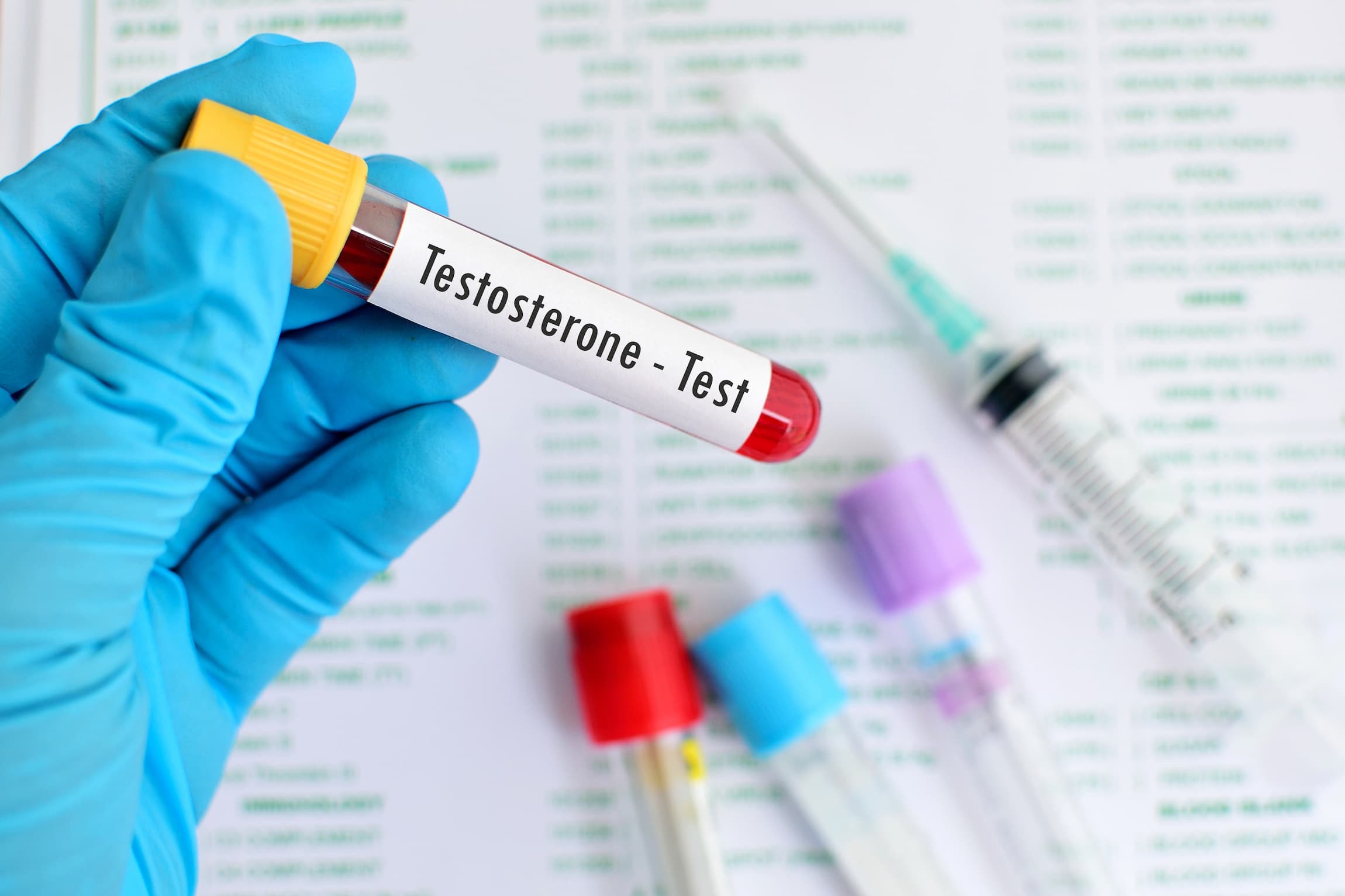Most of us are familiar with the hormone testosterone, which plays a vital role in sperm production and libido. While typically considered a “male” hormone, testosterone is also found in women and contributes to a number of other health functions, like the growth and maintenance of reproductive tissues. Though testosterone is a key player in fertility, there are other male hormones to know about, including luteinizing hormone and follicle-stimulating hormone.
Explore our guide to male hormones which explains the impact they have on sperm production, and why you should consider male hormonal testing for imbalances before starting a family.
Key takeaways:
- The body holds over 50 identified hormones, which serve as chemical messengers that tell the tissues and organs of the body what to do.
- Also known as androgens, male hormones refer to those that drive sperm production and sexual function. The most important ones are testosterone, luteinizing hormone (LH), and follicle-stimulating hormone (FSH).
- Male hormonal imbalances can cause low sperm count, erectile dysfunction, loss of libido, and other health issues. These imbalances can be caused by hormone therapy, injury, genetic diseases, and even lifestyle habits. Male hormone testing can help identify such imbalances.
- Correcting imbalances may require medication or tweaks to your lifestyle, or your doctor may recommend using assisted reproductive technology (ART) to help you conceive.
- Male hormone testing is a powerful way to help you gain deeper insights into your fertility overall.
What are hormones?
Hormones are chemical messengers made by endocrine glands, like the pituitary, pineal, thymus, thyroid, and adrenal glands. Hormones can also be produced by the testes and the ovaries. Scientists have identified 50 hormones in the human body so far.
As they circulate through the bloodstream, hormones regulate a variety of bodily processes, ranging from reproduction to metabolism. They play a critical role in:
- Homeostasis, specifically blood pressure and body temperature
- Growth and development
- Hunger and metabolic function
- Sexual desire
- Reproduction
- Mood
- Circadian rhythm
Hormones are incredibly potent, which means that even minor changes in levels can have profound effects on bodily processes, potentially requiring medical treatment. Some of the most common hormone-related health conditions include diabetes, thyroid disease, polycystic ovary syndrome (PCOS), obesity, and infertility. Male hormone testing can help detect these imbalances and reveal such conditions.
What are male hormones?
Also known as androgens, male hormones refer to those that drive sperm production and sexual function. The testicles, the pituitary gland, and the hypothalamus all contribute to the production of these hormones, and when there is an imbalance, individuals may experience azoospermia, in which there is no sperm in the semen, or oligospermia, which refers to low sperm count. Hormone imbalances may also cause erectile dysfunction and loss of libido. As such, male hormone testing can help you identify the root cause of male-factor infertility.
All the hormones work together and, when balanced, provide the greatest chance of conceiving. The three main hormones driving reproduction are testosterone, luteinizing hormone, and follicle-stimulating hormone.
Testosterone
Commonly considered the quintessential male hormone, testosterone is responsible for the
growth and development of the male sex organs (the penis and testes) and the development of secondary “male” physical characteristics during puberty, such as an increase in muscle mass, body hair, height, and a deeper voice. Testosterone also plays a vital role in sperm production and libido.
As a person ages, they may naturally produce less testosterone. But when levels are abnormally low, or less than 300 nanograms per deciliter, doctors refer to the condition as hypogonadism. Hypogonadism is linked to sexual dysfunction, reduced libido, hair loss, decreased muscle mass, irritability, and fatigue. The condition affects 4–5 million men in the U.S..
Though hypogonadism has been associated with subfertility, it is not impossible to conceive a child with low testosterone levels, because only a small amount of the hormone is needed for sperm production. Male hormone testing can help detect whether you have low testosterone levels. Having your sperm analyzed and making healthy lifestyle changes, like following a healthy diet, cutting back on alcohol, and avoiding extreme temperatures, can help reinstate balance. But one thing you should not do is supplement with testosterone as a solution. Testosterone replacement therapy actually disrupts the communication between glands, shutting down the production of other key reproductive hormones altogether.
Luteinizing hormone
Luteinizing hormone (LH) is responsible for stimulating the Leydig cells in the testes to produce testosterone, thereby supporting sexual function and sperm production. When there is too little LH, testosterone production plummets, halting sperm production and hindering fertility. When there is too much of the hormone, it may signal a bigger health issue at play, such as testicular damage due to infection or radiation, or the presence of a genetic disorder like Klinefelter syndrome. LH levels can also be identified with male hormone testing.
Normal LH levels in people with testes over 18 years of age is around 1.8 to 8.6 IU/L. Studies show that although isolated luteinizing hormone deficiency is rare, it usually occurs with testosterone replacement therapy, which decreases or stops the production of LH due to its negative-feedback effect. Doctors may test for LH levels if you are having trouble conceiving after a year of trying or if you have low sex drive.
Follicle-stimulating hormone
Follicle-stimulating hormone (FSH) plays a crucial role in reproduction and pubertal development. This hormone stimulates the testicles to produce sperm and also regulates the production of androgen-binding proteins required for sperm production. When FSH levels are too low, it may indicate a disorder of the pituitary gland or hypothalamus, resulting in low sperm quality and reduced sperm production. If there is too much of the hormone, it may mean the testicles are not functioning properly due to injury, age, a genetic disorder, or tumors. Male hormone testing will help diagnose FSH levels and outline whether they are too low or if there is an imbalance.
Normal FSH levels are between 1.5 and 12.4 mIU/mL in adults. Like its effect on LH levels, testosterone replacement therapy can also negatively impact FSH levels, as can the use of anabolic steroids, resulting in low sperm count and concentration. Some doctors use FSH as fertility medication, often combined with LH and human chorionic gonadotropin (hCG) to increase the success of in vitro fertilization (IVF) cycles.
Hormones and sperm production
Though testosterone is not directly related to sperm production, it is still intricately connected to the two main hormones for sperm production: LH and FSH. When there is an imbalance in one hormone, it causes a chain reaction affecting the other two hormones, which is why LH and FSH levels go down if you start taking a testosterone supplement. Because the hormones communicate with each other, each one is vital to your sperm health and overall fertility.
Taking its cues from the endocrine system, or specifically the hypothalamic-pituitary-gonadal (HPG) axis, the secretion of LH stimulates Leydig cells to produce testosterone. Meanwhile, FSH stimulates Sertoli cells, in synergy with testosterone, to produce the molecules and nutrients required for the maintenance of spermatogenesis. All components are needed to fulfill the process of making sperm, while the sexual function facilitated by testosterone helps to deliver the sperm to its destination, the egg. As such, male hormone testing can play an integral role if you are considering starting a family.
What causes hormonal imbalance?
Hormones naturally fluctuate as you age, but sometimes medical conditions or lifestyle habits can cause the endocrine glands to malfunction, leading to a hormonal imbalance. Common causes of hormonal imbalance include:
- Hormone supplementation (like testosterone replacement therapy)
- Steroid use
- Chemotherapy or radiation
- Tumors
- Genetic disorders
- Autoimmune conditions (like diabetes, Hashimoto’s, Addison’s disease, or polyglandular syndromes)
- Thyroid diseases
- Stress
- Injury or trauma
- Poor nutrition
Symptoms of male hormonal imbalance
Symptoms will vary depending on which gland is affected and which hormones are imbalanced. Some signs you may have a hormonal imbalance include:
- Abnormal semen analysis results
- Infertility
- Erectile dysfunction
- Decrease in or loss of body hair
- Enlarged breast tissue
- Loss of libido
- Unexplained weight gain or weight loss
- Fatigue
- Depression or anxiety
Though the above symptoms may indicate a hormonal imbalance, the best way to be certain is to have your hormones tested.
How can I test for hormonal imbalance?
Male hormonal testing is typically performed using a blood sample, but some tests require urine or saliva samples. There are a number of ways to test for hormonal imbalances, including at-home male hormone testing kits and tests performed at a clinic. If your physician is hormone testing for pregnancy or infertility, male hormone testing may be covered by your insurance. Otherwise, the costs range from $200 (at-home) to $1,500 (clinic). You can also choose how comprehensive you want the testing to be. Some tests specifically check for one hormone, like testosterone, and others analyze various hormone levels. Depending on your particular symptoms, your physician should be able to determine which test is right for you.
Hormonal health and male fertility
Hormone testing can provide crucial insights to those who are dealing with infertility issues. Once you know which hormone is off, you can work with doctors to develop an action plan to reestablish balance. This may include taking medication or, sometimes, it can be as easy as changing up your dietary habits or finding healthier ways to cope with stress. In some cases, your doctor might recommend using assisted reproductive technology to conceive a child, like in vitro fertilization (IVF) or intrauterine insemination (IUI).
If you are having trouble conceiving, it’s ideal for you and your partner to get tested. Male hormone testing for infertility is a great place to start, along with semen analysis. Legacy’s at-home semen analysis kit allows you to test your sperm health from the comfort of your own home and provides an in-depth analysis of key sperm parameters, like sperm count/concentration, motility, and morphology. All results are reviewed by our medical staff, who will provide you with personalized recommendations based on your results.
Facing infertility issues can be stressful, but testing empowers you with an action plan that can make the journey easier. And even if you’re not sure you want to have children, having your semen or your hormones tested can give you a head start on improving your health should you decide to take that path in the future.



